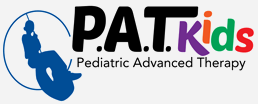How do you know if OT can help your child?
- Avoids touching or being touched (especially if unexpected), dislikes getting dirty, seems unaware of pain, and/or displays upset with daily routine tasks such as dressing, bathing, washing hair, cutting nails, etc.
- Seems clumsy or uncoordinated (taking longer than expected to learn motor skills, bumps into other people or objects in the environment, falls often, etc.)
- Poor eye contact or difficulty interacting with adults/peers
- Covers ears, becomes upset, or complains about loud noises
- Difficulty following verbal directions or completing steps of daily routines
- Limited diet (does not eat certain food textures or temperatures, gags on food, etc.)
- Avoid movement activities such as swings, slides, hesitates on curbs or uneven surfaces, etc.
- Appears to be in constant motion, fidgety, difficult time sitting still
- Overly rough when playing
- Difficulty imitating actions
- Unsafe in community or at home
- Disruptive behaviors-impulsive, limited attention, resistive to new activities/changes in routine, difficulty moving from one activity to another, gives up easily, difficulty calming self
Welcoming PlaceWith Quality Care
Our philosophy is learning through play as we offer a stimulating environment for children. Our philosophy is learning through play as we offer.
- Friendly Place
- Online Access
- Varied Classes
- Full Day Sessions


Total Groups
Qualified Teachers
Years of Experience
Students Enrolled
Speech Therapy
Speech is a crucial tool in aiding your child’s development and learning. Speech therapy helps to treat disorders of speech, language, communication, swallowing/feeding and more. Our therapists create individualized plans of treatment to help your child function more independently and improve their quality of life. Our experienced and highly trained speech therapy staff specializes in a variety of speech therapy needs including:
How We Help
- Receptive Language – how a child understands his environment
- Expressive Language – how a child uses sounds, words and gestures to communicate wants and needs
- Articulation – how a child uses speech sounds in words and phrases
- Phonological Processes –how a child understands the rules of putting sounds together to make words
- Apraxia of Speech – or “motor planning”. The child may have the word he wants to say in his brain, but is unable to get the “message” from his brain to his mouth.
- Auditory Processing Disorder – how a child understands or misunderstands auditory input
- Pragmatic Language – how a child interacts in social settings
- Hearing Loss/Aural Rehabilitation – how a child with a hearing impairment understands and interacts in his environment
- Autism Spectrum Disorder
- Sensory Integration
- Oral Motor – how a child’s oral structure functions, including strength and coordination
- Feeding Therapy – Immature or delayed oral motor or swallowing skills
- Cleft Lip/Palate
- Fluency/Stuttering – how a child produces sounds, words and phrases with fluency
- Voice Disorders – when a child presents with poor vocal quality


How Do You Know If Speech Therapy Can Help Your Child?
Our Speech Therapy Screening Tool is a great way to determine if pediatric speech therapy is right for your child and can help him/her meet life’s challenges. Your child may benefit from speech therapy intervention if he/she has experienced or is experiencing any of the issues below.
- Does not follow or watch your face when speaking
- Does not smile or laugh in response to your smiles and laughs
- Does not follow directions easily
- Cannot use age-appropriate words and grammar
- Limited interest in toys and/or plays with them in an unusual way
- Has lost words he/she used to say
- Stutters when talking
- Has an ongoing hoarse voice
- Has problems with chewing or swallowing
